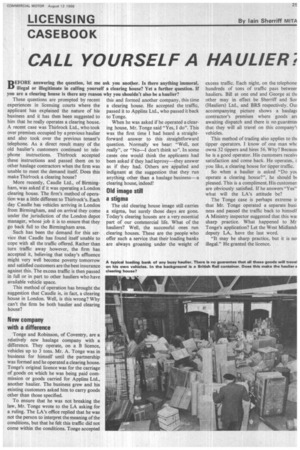LICENSING CASEBOOK
Page 27

If you've noticed an error in this article please click here to report it so we can fix it.
CALL YOURSELF A HAULIER;
BEFORE answering the question, let me illegal or illegitimate in calling yourself you are a clearing house is there any reason
These questions are prompted by recent experiences in licensing courts where the applicant has explained the nature of his business and it has then been suggested to him that he really operates a clearing house. A recent case was Thirlrock Ltd., who took over premises occupied by a previous haulier and also took over the previous tenant's telephone. As a direct result many of the old haulier's customers continued to telephone instructions. Thirlrock accepted these instructions and passed them on to other haulage contractors when the firm was unable to meet the demand itself. Does this make Thirlrock a clearing house?
More recently, Caudle Ltd., of Birmingham, was asked if it was operating a London clearing house. The firm's method of operation was a little different to Thirlrock's. Each day Caudle has vehicles arriving in London from Birmingham, and on arrival they come under the jurisdiction of the London depot manager, whose job it is to ensure that they go back full to the Birmingham area.
Such has been the demand for this service that Caudle has found itself unable to cope with all the traffic offered. Rather than turn traffic away however, the firm has accepted it, believing that today's affluence might very well become poverty tomorrow and satisfied customers are the best insurance against this. The excess traffic is then passed in full or in part to other hauliers who have available vehicle space.
This method of operation has brought the suggestion that Caudle is, in fact, a clearing house in London. Well, is this wrong? Why can't the firm be both haulier and clearing house?
New company with a difference
Tonge and Robinson, of Coventry, are a relatively new haulage company with a difference. They operate, on a B licence, vehicles up to 3 tons. Mr. A. Tonge was in business for himself until the partnership was formed and he operated a clearing house. Tonge's original licence was for the carriage of goods on which he was being paid commission or goods carried for Applins Ltd., another haulier. The business grew and his existing customers asked him to carry goods other than those specified.
To ensure that he was not breaking the law, Mr. Tonge wrote to the LA asking for a ruling. The LA's office replied that he was not the person to interpret the meaning of the conditions, but that he felt this traffic did not come within the conditions. Tonge accepted ask you another. Is there anything immoral, a clearing house? Yet a further question. If why you shouldn't also be a haulier?
this and formed another company, this time a clearing house. He accepted the traffic, passed it to Applins Ltd., who passed it back to Tonge.
When he was asked if he operated a clearing house, Mr. Tonge said "Yes, I do". This was the first time I had heard a straightforward answer to this Straightforward question. Normally we hear: "Well, not really", or "No—I don't think so". In some cases one would think the applicants had been asked if they had leprosy—they answer as if they had. Others are appalled and indignant at the suggestion that they run anything other than a haulage business—a clearing house, indeed!
Old image still a stigma
The old clearing house image still carries a stigma, but surely those days are gone. Today's clearing houses are a very essential part of our commercial life. What of the hauliers? Well, the successful ones run clearing houses. These are the people who offer such a service that their loading banks are always groaning under the weight of excess traffic. Each night, on the telephone hundreds of tons of traffic pass betweer hauliers. Bill at one end and George at tin other may in effect be Sherriff and Sor (Hauliers) Ltd., and BRS respectively. Oui accompanying, picture shows a haulag( contractor's premises where goods an awaiting dispatch and there is no guarante( that they will all travel on this company'! vehicles.
Thismethod of trading also applies to tin tipper operators. I know of one man whc owns 32 tippers and hires 56. Why? Becaust he is a good operator. His customers receiv( satisfaction and come back. He operates, i you like, a clearing house for tipper traffic.
So when a haulier is asked "Do yot operate a clearing house?", he should IN pleased, This is a compliment. His customer: are obviously satisfied. If he answers "Yes" what will the LA's attitude be?
The Tonge case is perhaps extreme ir that Mr. Tonge operated a separate business and passed the traffic back to himself A Ministry inspector suggested that this wa! sharp practice. What happened to Mr Tonge's application? Let the West Midland! deputy LA, have the last word.
"It may be sharp practice, but it is no illegal." He granted the licence.












































































































